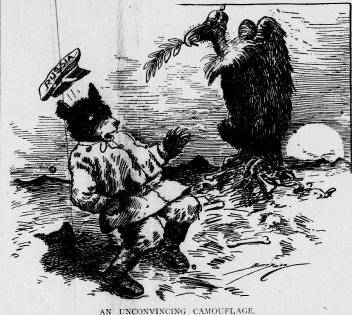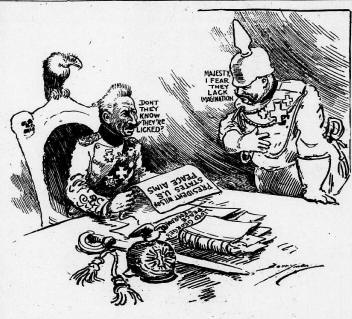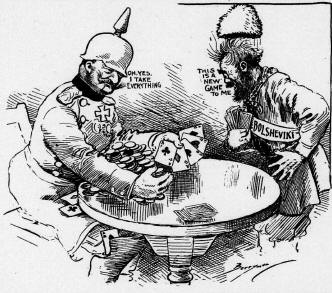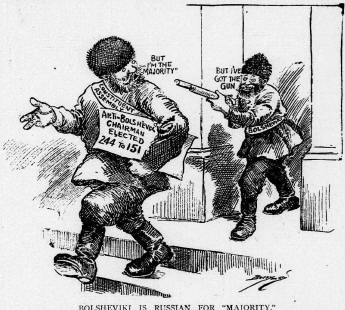January 1918
The Brest-Litovak Peace Conference
January 4
Peace Negotiations Broken Off
 The Peace negotiations at Brest-Litovak had been broken off by the Bolshevik government, owing to the German demand that Poland and Lithuania be granted their freedom.
The Peace negotiations at Brest-Litovak had been broken off by the Bolshevik government, owing to the German demand that Poland and Lithuania be granted their freedom.
The Bolshevik newspaper, Investia, said the Russian delegation, acting on unequivocal instructions from the Bolshevik authorities, took an uncompromising attitude. They said self-determination was impossible until the last German soldier had left the country. Further, they jeered the Germans, asking what they propose to do.
They asked whether they intended to take Petrograd and feed three million starving folk, or disarm a revolutionary country in which every workman had a rifle.
Key elements of the peace terms presented by the Germans included:
Article 1 - Russia and Germany are to declare the state of war at an end. Both nations are resolved to live together in the future in peace and friendship on condition of complete reciprocity. Germany will be ready as soon as peace is concluded with Russia and the demobilization of the Russian armies has been accomplished, to
evacuate her present positions in occupied Russian territory insofar as no different interference results from article 2.
Article 2 - The Russian government, having in accordance with its principles, proclaimed for all people without exception living within the Russian Empire the right of self-determination, including complete separation, take cognizance of the decisions expressing the will of people demanding a full state of independence in
separation from the Russian Empire for Poland, Lithuania, Courland, and portions of Estonia and Latvia.
Article 3 - Treaties and agreements, enforced before the war, are to become effective if not directly in conflict with changes resulting from the war.
Article 5 - The parties agree that upon conclusion of peace, the economic war shall cease. During the time necessary for the restoration of relations, there may be limitations upon trade, but regulations as to imports are not to be of a burdensome extent and high taxes or duties upon imports shall not be levied.
Article 7 - The parties will grant one another, during at least 20 years, the right of the most-favored-nation in questions of commerce and navigation.
Article 8 - Russia agrees that the administration of the mouth of the Danube be entrusted to a European Danube Commission, without membership from the countries bordering upon the Danube and the Black Sea.
Article 10 - Parties are not to demand payment of war expenditures, nor for damages suffered during the war.
Article 12 - Prisoners of war who are invalid will be immediately returned. The exchange of other prisoners is to be made as soon as possible; the times to be fixed by a German-Russian commission.
The Russian delegation, upon its return from Brest-Litovak, laid Germany's demands before the Council of Workmans’ and Soldier’s Delegates. The Council unanimously declared that the German peace terms were unjust. Even the most radical Bolshevik and the most ardent peace advocate have been aroused by the German position.
Indications are that the Germans’ attitude is harmonizing domestic differences and is convincing Russians that they must fight to save their revolutionary principles. Russia may quite possibly witness a revival of the war; if not in the most active of form, at least a defensive war, necessitating the retention of a considerable German force on the
frontier.
The Turkish government has presented its terms for peace with Russia. They included: Russian evacuation of Turkish territory and the demobilization of the Russian Black Sea Fleet. Turkey, it is provided, is to retain her active army in consequence of the continuation of war against the Allies.
The Ukraine, meanwhile, appears willing to strike a bargain with the Germans. The Germans are willing to recognize the Ukraine on the basis that the Ukrainians supply Germany with foodstuffs and recognize the German sphere of influence in the former Russian territories now occupied by the Germans. Neither of these points is to
Little Russia's taste, but if the Allies fail to help the Ukraine the Ukrainians may have to yield.
January 11
British Set Peace Terms
 The British Prime Minister set forth Great Britain's war aims more specifically and at greater length than he's ever done before.
The British Prime Minister set forth Great Britain's war aims more specifically and at greater length than he's ever done before.
First among these was the restoration of Belgium and the reparation for the injures inflicted. Next came the restoration of Serbia, Montenegro and the occupied parts of France, Italy and Romania. France must have Alsace-Lorrine.
When the question of Russia was touched upon, the Prime Minister said that he would have been proud to fight by the side of the new Russian democracy, but now Russia can only be saved by her own people.
"Romania is to be protected," he said, and the British and other allies are with Italy and her desire for complete union of the people of Italian race into one nation. Of Austria-Hungary, he felt that while the breaking up of the Duel Monarchy was not part of the Allied war aims, it was impossible to hold for the removal of
causes of unrest in that part of Europe, unless genuine self-determination was granted to the Austrian-Hungarian nationalities.
The Turkish Empire, he said, within the homeland of the Turkish race, with Constantinople as its capital, may be maintained, but the passage between the Mediterranean and the Black Sea must be internationalized, and Arabia, Armenia, Mesopotamia, Syria and Palestine are entitled to recognition of their separate national
conditions.
Germany Prepares For New Western Offensive
The great question of the hour is where on the Western front the threatened German offensive is to take place. The latest reports, which seemed to be based on excellent authority, is that the Germans’ objective is Calais. If the Germans could reach that port it would cut off the narrow passage between Calais and Dover, where
their submarines have been unable to work and possibly force the British fleet into the open.
The expected German offensive will probably be their greatest assault, but the British and French armies can be relied upon to withstand the shock. Six weeks have elapsed since the first rumors of a possible great thrust in the West, which the enemy announced as imminent, began. By simultaneous activity at Verdun, the Germans
could hold the French army where it would be prevented from helping the British and might even delay the American aid, which, it is assumed, would be extended first to the French.
Finland Declares Independence From Russia
Sweden’s recognition of the independence of Finland was greeted with enthusiasm. Recognition by Denmark and Norway may be expected soon. Finland’s new flag, a yellow lion on a red background, is already flying in many places. Hopes are expressed in many quarters that the United States will be the next to recognize Finland, but
it is realized that any steps taken in this direction will have to be with the approval of the Allies.
Finland’s prompt admission to the Scandinavian block has ensured the extension of the block clear from the North Sea to the suburbs of Petrograd, thus consolidating northern Europe into one closely linked organization, the voice of which to the outside world is unanimous.
Russians Hope Germans Will Bring End To Chaos
No Russian Christmas in 300 years has been celebrated with such tragic circumstances. Petrograd is full of dirt, disorder and crimes. Burglary, robbery and murder, in the most audacious forms, prevail to an extent heretofore unknown and there is no police or other authority in which to appeal to. The food situation is very
critical and starvation appears to be staring the people in the face. The only bread to be had is black, gritty and underdone and some is composed of miller's refuse and mixed with straw. Potatoes are getting scarce and dear, while meat is a rare luxury. The wretched conditions of existence had been aggravated by blinding snow storms drifted by
violent winds for three days and nights with temperatures at 14EF.
Russian affairs have become so desperate that only intervention of the Allies and the Germans can prevent a catastrophe. Help such as this can no longer be expected from the Allies. The disheartened Russians look to the Germans to put an end to the awful chaos in which the country now is involved.
Leon Trotsky, the Bolshevik Foreign Minister, is convinced that the Allied governments are hoping Germany will make an advantageous separate peace with Russia, so that Germany will more willingly surrender what the Allies want in the West. Just as Allied sabotage of the Stockholm Conference destroyed the last hope of rallying
the old Russian army under Kernesky, so refusal to support Russia at a general peace conference tends to strengthen German opposition to Trotsky.
Meanwhile, a peace agreement has been signed between Russia and Bulgaria at Brest-Litovak. According to the peace terms, Bulgaria gets to retain the territories she has won. This would not interfere with the peace between Russia and Bulgaria, however, in so much as the territory Bulgaria desires consists of parts of Serbia and
Romania. The Bolshevik government has refused the peace proposal made by Turkey.
January 18
German Russian Peace Negotiations Resume
 Leon Trotsky, the Bolshevik Foreign Minister, has returned to the peace conference at Brest-Litovsk saying that in order not to leave any possibility in the fight for peace unutilized, the Russian delegation accepted the demands that the
negotiations be continued at Brest-Litovsk. Trotsky proposed that the present armistice between Russia and Germany be prolonged for another month. The Central Powers accepted the proposal.
Leon Trotsky, the Bolshevik Foreign Minister, has returned to the peace conference at Brest-Litovsk saying that in order not to leave any possibility in the fight for peace unutilized, the Russian delegation accepted the demands that the
negotiations be continued at Brest-Litovsk. Trotsky proposed that the present armistice between Russia and Germany be prolonged for another month. The Central Powers accepted the proposal.
It is the belief of many that the Central Powers, being assured that Russia will not be supported by the Allies at a general peace conference, are deliberately taking a more uncompromising position with a view of strengthening the military annexation elements within the German and Austrian governments, by showing the obvious
trophies of the annexation policy. They know Russia cannot continue the war in the ordinary sense, except under desperate conditions. They know, further, that acceptance of Russia’s peace terms would not be rewarded by a general peace. Therefore, they are doing their best to keep the frontiers of the Marxist revolution as far as possible from the
frontiers of Germany.
Even after peace is signed, Russia will not be a peaceful neighbor and the Germans would prefer that the Baltic barons put down revolution in Courland then have the revolution spreading over their own borders. They know that as German troops leave the occupied territory the Russian revolution will come in.
Germany Rejects Allied Peace Terms
Germany’s answer to Premier Lloyd George and Pres. Wilson will be given with the sword, according to the German Foreign Minister. The principle objection to Lloyd George and Pres. Wilson’s peace terms of war is that they: "talk as if Germany was down and out, whereas," said the German Foreign Minister, "the fact is our
military position was never better than today and we still have some surprises up our sleeve." Wilson’s program about Alsace-Lorraine makes no sympathetic impression on the Germans who are absolutely against giving up that territory.
The German Foreign Minister said he knew the Russian delegation would come back to Brest-Litovsk. He said, "There is nothing else for them to do. Their tenure of power is based on Russia’s demand for peace, and if they do not get peace for Russia, they will lose their jobs. That is why we felt confident they would talk
business again."
"The negotiations," he said, "are progressing satisfactorily. We expect commerce to resume in full with Russia by spring. We have plenty of experts already waiting to go into Russia to help the worker organization."
Unrest Builds In Germany And Austria
The Germans are doing their utmost to stop fraternization at the front. The Germans are confiscating all copies of Russian newspapers printed in German that contain accounts of the Brest-Litovsk negotiations and other propagandist literature, for fear the unrest in the ranks of the Russian army will spread to the German army.
Notwithstanding this, he adds, the German soldiers crawl across the Russian lines every night to obtain copies of Russian paper secretly.
A mutiny among submarine crews at the German Naval Base of Kiel resulted in 38 officers being killed. The mutiny is said to have begun by submarine crews, and subsequently to have spread to portions of the crews of cruisers stationed at Kiel. Although the mutiny was local, it shows the German naval men are dissatisfied,
especially in the submarine service, as the number of boats returning to German ports is decreasing every month.
Meanwhile, it is reported that serious strikes, accompanied by rioting, have taken place in Vienna and in other cities throughout Austria. The troubles, it is asserted, are due to the prolongation of the peace negotiations at Brest-Litovsk, the continuation of the reduced bread rations - one half of the former allotment - and
police measures against meetings of the workers.
January 25
Bolsheviks Stop Constitutional Assembly
 The long-delayed constitutional assembly was opened in Petrograd on Saturday. On the first test of the strength, the Social Revolutionists defeated the Bolsheviks. M. Tchernoff, Minister of Agriculture in the Kerensky government, and the nominee of the
Social Revolutionist Party for the chairman of the Assembly, won by a vote of 244 to 151.
The long-delayed constitutional assembly was opened in Petrograd on Saturday. On the first test of the strength, the Social Revolutionists defeated the Bolsheviks. M. Tchernoff, Minister of Agriculture in the Kerensky government, and the nominee of the
Social Revolutionist Party for the chairman of the Assembly, won by a vote of 244 to 151.
The Constitutional Assembly, according to a proclamation issued by the Revolutionary government last March, was to issue fundamental laws guaranteeing the country the immutable rights of equality and liberty. Failure to call for elections to the Assembly was one of the causes contributing to the downfall of the Kerensky
government. The Bolshevik government issued a call for election soon after the success of the revolt last November. The elections were completed early in December.
An attempt to open the Assembly was made on December 12, but no progress was made, as the results of the elections were unfavorable to the Bolsheviks. The Social Revolutionists, of which party former Premier Kerensky was a member, gained the greatest number of delegates. A number of Constitutional Democratic delegates to the
Assembly were arrested early in December by the Bolsheviks, who have been reported to be using various measures to gain control of the Assembly, even going as far as to call special elections to replace their opponents.
Much uncertainty existed as to what effect the convening of the new body would have upon the foreign and domestic policies of Russia. There have been indications from the Bolshevik side that the new body would be ignored by the Bolsheviks, and a new independent legislative body would be set up if the Assembly challenged the
Bolshevik’s power.
A declaration from the Congress of Workmans’ and Soldier’s Delegates, demanding that the Constitutional Assembly approve Bolshevik laws concerning peace and land, was applauded loudly by the Bolshevik delegates and booed by the Social Revolutionists.
The new chairman of the Assembly, Tchernoff, was one of the political leaders who attended a conference at Russian headquarters in November, to form a new government in opposition to the Bolsheviks. The hostile attitude of the Maximalists toward their opponents was evidenced by the insults hurled at Tchernoff by the Bolsheviks
in the course of the sitting of the Assembly.
Tchernoff spoke for an hour, depicting in dark colors the conditions surrounding the meeting of the Assembly. "The country," he said, "is disorganized; the people deprived of liberty of person and of speech and menaced by famine." He said the peace negotiations being conducted would make revolutionary Russia a vessel of German
imperialism and a tool of international capitalists, and called upon the assembly to refuse to submit to the dictatorship of the minority. Whereupon the Bolshevik members walked out of the Assembly and had it forcibly dissolved by troops under their direction on the ground of its counterrevolutionary sentiments.
The Bolsheviks are now hunting out the supporters of the Constitutional Assembly. Newspapers report the suppression of all non-socialist newspapers, while Red Guards are searching Petrograd for papers containing reports of the first session of the assembly, which are being destroyed.
Germans Give Ultimatum To Russia To Accept Peace Terms
"Russia must give up Courland and all the Baltic provinces or the Germans will resume military operations within a week," the German delegation at the Brest-Litovsk negotiations informed Russian representatives.
The secretary of the Ukrainian delegation gave out an account of the meeting. It says the Russians put a question to the delegates of the Central Powers as to what were their final peace terms. One of the German delegates replied by opening a map and pointing out a line, which they insisted should constitute the future
frontiers of Russia: from the shores of the Gulf of Finland, to the east of the Moon Sound Islands, to the west of Minsk to Brest-Litovsk, completely eliminating Courland and all the Baltic provinces from Russia.
The Russians asked the terms of the Central Powers in regard to the territory south of Brest-Litovsk. The Germans replied stating that was a question upon which they would discuss only with the Ukraine. When the Russian member asked: "Suppose we do not agree to such a condition, what are you going to do?" The German Minister
replied that: "within a week we will begin advancing."
The Russians then asked for a recess. The Germans declared it was the last postponement to which they would consent. The request was made by Leon Trotsky, who said he desired opportunity to lay the German peace terms before the Council of Workman’s and Soldiers Delegates.
Germans regard the Russian situation as being very critical, papers say that the latest news from Petrograd shows that Bolsheviks’ privacy is seriously threatened, and the question now arises as to whether it would be wise to negotiate further with men whom anarchy at any moment may sweep away.
German newspapers draw an extraordinary picture of the state of affairs on the Russian front. They declare the Russian front line is melting away through the desertions of full units whose officers have been disposed of or have fled. For weeks, material has been transported away, but much of it was abandoned and lies buried
under the snow. Guns, especially those of heavy caliber, were often left in their positions while the supply of ammunition has almost ceased.
Meanwhile, the negotiations between the Central Powers and The Ukrainian People’s Republic, has resulted in an agreement of a peace treaty and the war between the two has been declared terminated. The troops of both sides will be withdrawn, and arrangements have been made for the immediate resumption of economic intercourse
and resumption of diplomatic and consular relations as soon as possible.
Read past editions of News Reports From the Front
Have a newspaper clipping on a event that took place in Emmitsburg?
If so, send it to us at history@emmitsburg.net